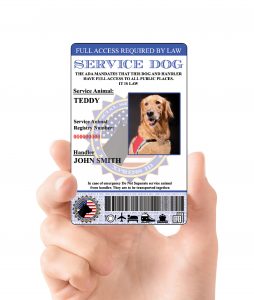Service and Emotional Support Dogs and PTSD
Post Traumatic Stress Disorder is a well-known affliction that affects millions of people from all walks of life every year. Simply put, PTSD occurs after one experiences a traumatic event or situation which tends to trigger future responses and can result in mood swings and panic attacks along with a variety of other symptoms that make it difficult for a person to carry on with his/her daily life and routine.
While PTSD occurs within all walks of life, more and more frequently we are seeing its effect on returning veterans, first responders, and healthcare workers.
Service and emotional support dogs are proving to be very useful in providing support to PTSD sufferers and may prove to be one of the key components in helping those afflicted to cope with everyday social situations. Handlers that require such assistance are not required to carry a service dog id but should consider too, why? because even though its not mandated by the Ada service dog id card could help avoid long confrontations and rejection from uneducated entities.
PTSD Service Dog are selected for their temperament and personality. One important consideration is how sociable the prospective dog appears.
It has been widely acknowledged by mental health professionals that the very act of acquiring a dog helps patients in the recovery process. This may occur for a variety of reasons. First dogs – especially service dogs, appear to have a heightened sense of intuition when it comes to people who are suffering from a mental health disorder. If a person is having difficulty managing to interact with others in certain situations or perhaps going to certain areas of their immediate environment; dogs seem to be able to intuit or sense these feelings and can assist their owner in such ways as distracting him/her or counter-balancing a flight or panic response they sense coming from their human partner.
A handler who suffer from PTSD
Another reason for this success may be the symbiotic nature of a PTSD sufferer and his/her service dog. Not only is the service dog there to assist but the person recovering from PTSD has now become more than a patient or sufferer or victim: he/she has now become a dog owner with all the responsibilities and obligations that this entails. This, in turn, often has the effect of changing the way they tend to view themselves. Often a sense of being victimized or of being helpless and anxious is replaced by the understanding that they are now gaining control. They necessarily understand that this animal is dependent upon them.
A service dog which is trained to assist people with PTSD is “on the clock” all the time. That is, it is there even when its owner is asleep and will comfort its human partner even though the worst of nightmares.
Service dogs that are specifically trained to assist with PTSD will recognize signs of distress and will display calming behaviors they have been taught. Such behaviors may include reaching out with a paw or their head to touch their owner or some other comforting behavior such as leaning in or nesting.
PTSD is a complicated condition which requires a multi-faceted approach when helping people cope. Treatment of this disorder may involve medication, therapy, along with self-education. The inclusion of service or emotional support dogs in the treatment process has not only proven to be beneficial but in many cases, life-changing.
Buy A Service Dog ID
